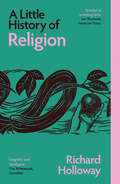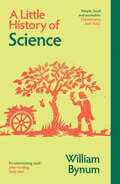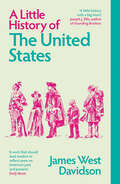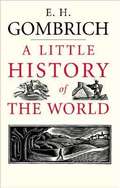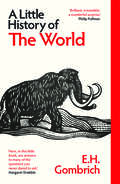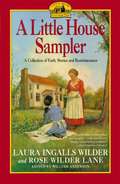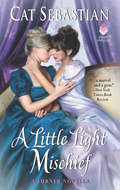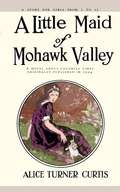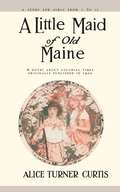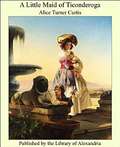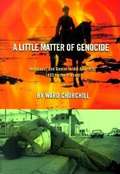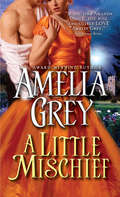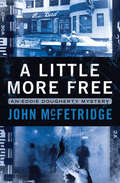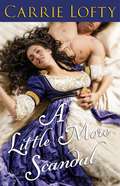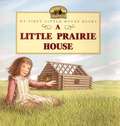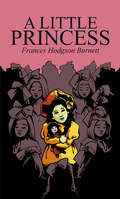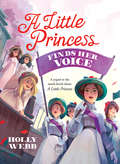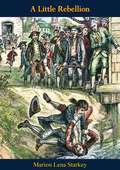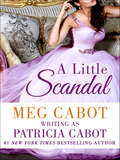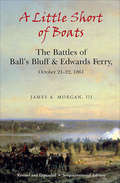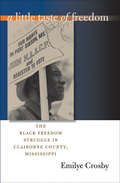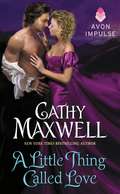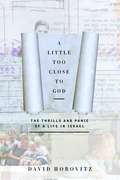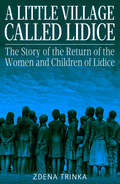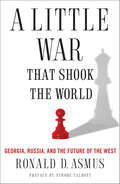- Table View
- List View
A Little History of Religion
by Richard HollowayFor curious readers young and old, a rich and colorful history of religion from humanity's earliest days to our own contentious times In an era of hardening religious attitudes and explosive religious violence, this book offers a welcome antidote. Richard Holloway retells the entire history of religion--from the dawn of religious belief to the twenty-first century--with deepest respect and a keen commitment to accuracy. Writing for those with faith and those without, and especially for young readers, he encourages curiosity and tolerance, accentuates nuance and mystery, and calmly restores a sense of the value of faith. Ranging far beyond the major world religions of Judaism, Islam, Christianity, Buddhism, and Hinduism, Holloway also examines where religious belief comes from, the search for meaning throughout history, today's fascinations with Scientology and creationism, religiously motivated violence, hostilities between religious people and secularists, and more. Holloway proves an empathic yet discerning guide to the enduring significance of faith and its power from ancient times to our own.
A Little History of Science
by William BynumScience is fantastic. It tells us about the infinite reaches of space, the tiniest living organism, the human body, the history of Earth. People have always been doing science because they have always wanted to make sense of the world and harness its power. From ancient Greek philosophers through Einstein and Watson and Crick to the computer-assisted scientists of today, men and women have wondered, examined, experimented, calculated, and sometimes made discoveries so earthshaking that people understood the world—or themselves—in an entirely new way. This inviting book tells a great adventure story: the history of science. It takes readers to the stars through the telescope, as the sun replaces the earth at the center of our universe. It delves beneath the surface of the planet, charts the evolution of chemistry's periodic table, introduces the physics that explain electricity, gravity, and the structure of atoms. It recounts the scientific quest that revealed the DNA molecule and opened unimagined new vistas for exploration. Emphasizing surprising and personal stories of scientists both famous and unsung,A Little History of Sciencetraces the march of science through the centuries. The book opens a window on the exciting and unpredictable nature of scientific activity and describes the uproar that may ensue when scientific findings challenge established ideas. With delightful illustrations and a warm, accessible style, this is a volume for young and old to treasure together.
A Little History of the United States
by James West DavidsonHow did a land and people of such immense diversity come together under a banner of freedom and equality to form one of the most remarkable nations in the world? Everyone from young adults to grandparents will be fascinated by the answers uncovered in James West Davidson's vividly told A Little History of the United States. In 300 fast-moving pages, Davidson guides his readers through 500 years, from the first contact between the two halves of the world to the rise of America as a superpower in an era of atomic perils and diminishing resources. In short, vivid chapters the book brings to life hundreds of individuals whose stories are part of the larger American story. Pilgrim William Bradford stumbles into an Indian deer trap on his first day in America; Harriet Tubman lets loose a pair of chickens to divert attention from escaping slaves; the toddler Andrew Carnegie, later an ambitious industrial magnate, gobbles his oatmeal with a spoon in each hand. Such stories are riveting in themselves, but they also spark larger questions to ponder about freedom, equality, and unity in the context of a nation that is, and always has been, remarkably divided and diverse.
A Little History of the World
by E. H. Gombrich Caroline MustillE. H. Gombrich's bestselling history of the world for young readers tells the story of mankind from the Stone Age to the atomic bomb, focusing not on small detail but on the sweep of human experience, the extent of human achievement, and the depth of its frailty. The product of a generous and humane sensibility, this timeless account makes intelligible the full span of human history. In forty concise chapters, Gombrich tells the story of man from the stone age to the atomic bomb. In between emerges a colorful picture of wars and conquests, grand works of art, and the spread and limitations of science. This is a text dominated not by dates and facts, but by the sweep of mankind's experience across the centuries, a guide to humanity's achievements and an acute witness to its frailties.
A Little History of the World
by E. H. GombrichIn 1935, with a doctorate in art history and no prospect of a job, the 26-year-old Ernst Gombrich was invited by a publishing acquaintance to attempt a history of the world for younger readers. Amazingly, he completed the task in an intense six weeks, andEine kurze Weltgeschichte für junge Leserwas published in Vienna to immediate success, and is now available in seventeen languages across the world. Toward the end of his long life, Gombrich embarked upon a revision and, at last, an English translation. A Little History of the Worldpresents his lively and involving history to English-language readers for the first time. Superbly designed and freshly illustrated, this is a book to be savored and collected. In forty concise chapters, Gombrich tells the story of man from the stone age to the atomic bomb. In between emerges a colorful picture of wars and conquests, grand works of art, and the spread and limitations of science. This is a text dominated not by dates and facts, but by the sweep of mankind's experience across the centuries, a guide to humanity's achievements and an acute witness to its frailties. The product of a generous and humane sensibility, this timeless account makes intelligible the full span of human history.
A Little House Sampler
by Laura Ingalls Wilder William Anderson Rose Wilder LaneLaura Ingalls Wilder, author of the classic Little House books that have delighted millions of readers, was first encouraged to write about her early days on the frontier by her daughter, Rose. This collection is comprised of Laura's early autobiographical pieces along with stories and essays by Rose, an award-winning writer who herself wrote about growing up on the family farm. From log cabins and covered wagons to the hardworking farm life that Laura and Rose fondly recall, A Little House Sampler is a vivid and personal testament to nearly one hundred years of American life and history as seen by two remarkable women.
A Little Light Mischief: A Turner Novella
by Cat SebastianA seductive thiefLady’s maid Molly Wilkins is done with thieving—and cheating and stabbing and all the rest of it. She’s determined to keep her hands to herself, so she really shouldn’t be tempted to seduce her employer’s prim and proper companion, Alice. But how can she resist when Alice can’t seem to keep her eyes off Molly?Finds her own heartFor the first time in her life, Alice Stapleton has absolutely nothing to do. The only thing that seems to occupy her thoughts is a lady’s maid with a sharp tongue and a beautiful mouth. Her determination to know Molly’s secrets has her behaving in ways she never imagined as she begins to fall for the impertinent woman.Has been stolenWhen an unwelcome specter from Alice’s past shows up unexpectedly at a house party, Molly volunteers to help the only way she knows how: with a little bit of mischief.
A Little Maid of Mohawk Valley
by Alice Turner CurtisIn May 1777, little Joanne Clarke and her friend Nancy Wagner are taken captive by a Native American, an ally of the British army. They are left in the woods where they find the Indian's pouch containing a letter with valuable information to the American Army at Albany.
A Little Maid of Old Maine
by Alice Turner CurtisTo help the men of Machias, Maine, capture an English gunboat in June 1775, Rebecca and Anna undertake a dangerous journey through a forest to get ammunition for them-- based on a true story of the brave effort of two girls to bring help to a little settlement on the Maine coast at the time of the Revolution.
A Little Maid of Ticonderoga
by Alice Turner CurtisThis is the story of a little girl whose home was among the Green Mountains of Vermont, then known as "The Wilderness," at the beginning of the American Revolution; and at the time when Ethan Allen and his brave soldiers were on guard to defend their rights.
A Little Matter of Genocide: Holocaust and Denial in the Americas, 1492 to the Present
by Ward ChurchillWard Churchill has achieved an unparalleled reputation as a scholar-activist and analyst of indigenous issues in North America. Here, he explores the history of holocaust and denial in this hemisphere, beginning with the arrival of Columbus and continuing on into the present. He frames the matter by examining both "revisionist" denial of the Nazi-perpatrated Holocaust and the opposing claim of its exclusive "uniqueness," using the full scope of what happened in Europe as a backdrop against which to demonstrate that genocide is precisely what has been-and still is-carried out against the American Indians. Churchill lays bare the means by which many of these realities have remained hidden, how public understanding of this most monstrous of crimes has been subverted not only by its perpetrators and their beneficiaries but by the institutions and individuals who perceive advantages in the confusion. In particular, he outlines the reasons underlying the United States's 40-year refusal to ratify the Genocide Convention, as well as the implications of the attempt to exempt itself from compliance when it finally offered its "endorsement. " In conclusion, Churchill proposes a more adequate and coherent definition of the crime as a basis for identifying, punishing, and preventing genocidal practices, wherever and whenever they occur. Ward Churchill (enrolled Keetoowah Cherokee) is Professor of American Indian Studies with the Department of Ethnic Studies at the University of Colorado-Boulder. A member of the American Indian Movement since 1972, he has been a leader of the Colorado chapter for the past fifteen years. Among his previous books have been Fantasies of a Master Race, Struggle for the Land, Since Predator Came, and From a Native Son.
A Little Mischief
by Amelia GreyAn earl is at his wit's end when his marriageable sister joins Miss Winslowe's Wallflower Society--and winds up accused of killing London's most eligible bachelor. "Absolutely charming. "--Heather Graham. Original.
A Little More Free: An Eddie Dougherty Mystery (The Eddie Dougherty Mysteries #2)
by John McFetridge&“Like [Elmore] Leonard, McFetridge is able to convincingly portray flawed figures on both sides of the law&” (Publishers Weekly). Montreal, Labor Day weekend, 1972. The city is getting ready to host the first game in the legendary Summit Series between Canada and the USSR. Three men set fire to a nightclub and thirty-seven people die. The Museum of Fine Arts is robbed and two million dollars&’ worth of paintings are stolen. Against the backdrop of these historic events, Constable Eddie Dougherty discovers the body of a murdered young man on Mount Royal. As he tries to prove he has the stuff to become a detective, he is drawn into the world of American draft dodgers and deserters, class politics, and organized crime . . . &“This terrific continuation of the narrative McFetridge began in Black Rock opens with a bang . . . Working with a deceptively simple style that echoes Joseph Wambaugh, McFetridge has delivered an unpredictable mystery, a fine character study, and a vivid snapshot of 1972 Montreal.&” —Publishers Weekly &“Brilliant . . . As a police procedural, A Little More Free is superb. As a sociopolitical human drama, it&’s even better—remember to breathe during those final few pages.&” —Winnipeg Free Press
A Little More Scandal
by Carrie LoftyRising star Carrie Lofty, author of Flawless and Starlight, continues her Christies family saga with A Little More Scandal, a sensual eBook novella featuring William Christie and the woman who steals his heart.Self-made industrialist Sir William Christie tempts the scorn of London society by attempting to seduce Catrin Jones, a modest but opinionated battlefield nurse who earned notoriety after surviving a naval shipwreck. His ambition to secure her exclusive story is part of his latest business plan, while her intention is to marry well before her moment of fame expires. With respectability, wealth, and security at stake, they must decide whether love is worth embracing just a little more scandal...
A Little Prairie House
by Laura Ingalls WilderA new little house for Laura! Pa picks a special spot on the prairie and builds his family a snug log cabin home.
A Little Princess (Puffin In Bloom Ser.)
by Frances Hodgson BurnettInitially doted on by a wealthy father, the kind and creative Sarah Crewe leads a pampered life and is regarded highly by most who meet her earning the nickname princess. Unfortunately, Sarah's fortunes quickly change when her father dies suddenly, after his latest mining venture fails. Now a penniless orphan Sarah is forced to live in the attic at the girl's school she attends and becomes the servant of the cruel headmistress, Miss Minchin. Sarah remains positive, bolstered by friends, her imagination and her own kindness, throughout her ordeals until a mysterious until a mysterious friend begins to offer her assistance and may hold the promise to a better life. Another classic tale of Burnett's, A Little Princess was inspired by a play written by her and was later adapted to film five times.
A Little Princess Finds Her Voice
by Holly WebbReturn to the magic of Burnett's classic tale as a brand new character finds her voice and uncovers the truth.Lottie dreams of leaving the strict care of Miss Minchin's boarding school, just like her friend Sara Crewe did years ago. But Lottie's mother is gone, and her father has found reasons not to visit her for the past two years. When he rejects an invitation to come visit for her eleventh birthday, Lottie's sure he's ashamed of her for some reason. To temper her heartbreak, Lottie plans a secret little rebellion that she knows he'll hate—she purchases a trinket from the Suffragettes with the birthday money he sent her.But when Lottie learns more about the Suffragette's mission, she begins to see the world with new eyes. And as she follows the women's movement, Lottie discovers a secret about her missing mother that could change her world forever...
A Little Rebellion
by Marion Lena StarkeyMiss Starkey, author of the famed Death in Massachusetts, with her customary magic touch here deals with the tragic interplay of arrogance in high places and ignorance in low.TIME: the wake of the American RevolutionPLACE: western MassachusettsSUBJECT: the series of revolts culminating in Shays’ RebellionPROVOCATION: plain human misery and the heartbreak and disillusionment that await the victors of warsThe Yankee farmer, having thrown off the tyranny of the British King, dreamed of a Utopia in which taxes would be trifling and debts remitted. Instead they faced the harsh edicts of the Boston aristocrats. Was this not enough to anger a man?So the embattled farmers of ‘76 once more picked up their muskets and took to the road, animated by the same spirit that had moved them 10 years before. They were supported by much of the old revolutionary paraphernalia: county conventions, committees of correspondence, resources solemnly taken.It wasn’t a long war. But it had consequences. No event that called Washington back to public life and impelled thirteen state governments of violently divergent interests to form a more perfect union can be lightly dismissed.Both sides soon invented their devils, for we have always been eager to believe, especially in rural America, in some great but essentially simple conspiracy in high places. The embattled farmers thought the Boston aristocrats aimed at tyranny, and Governor Bowdoin thought that British agents were behind the rebellion. Then as now, it was a time of inflation, high taxes, loyalty oaths—and anxiety. Then as now, arrogance and ignorance did their evil work.Miss Starkey, as always, has so steeped herself in the records left by plain people that the book reads like a novel, although there is not one word of fiction in it. It is a stirring revelation, in dramatic form, of the eternal conflict between man’s political illusions and hard reality.
A Little Scandal
by Meg Cabot Patricia CabotA marquis is tempted by his daughter’s new chaperone in this steamy Victorian romance by a #1 New York Times–bestselling author.From Meg Cabot, originally writing under the name Patricia Cabot, released as an e-book for the first time!When beautiful Kate Mayhew is hired as chaperone to Marquis of Wingate Burke Traherne’s headstrong daughter Isabel, the Marquis finds himself in an impossible predicament. Torn between the knowledge that she is exactly what Isabel needs but also, for him, the worst possible temptation, he finds himself in constant proximity with someone who threatens his independence.Known for his steely self-control since the day he caught his wife with a lover, Lord Wingate has vowed never to risk marriage again. In accepting his lordship’s offer of employment, the feisty Kate faces two perils; her wild attraction to a man who has sworn off love, and a date with her own scandalous past . . . which she cannot keep secret forever.
A Little Short of Boats: The Battles of Ball's Bluff & Edwards Ferry, October 21–22, 1861
by James A. Morgan III“Perhaps a small demonstration on your part would have the effect to move them,” wrote Maj. Gen. George B. McClellan to Brig. Gen. Charles P. Stone on October 20, 1861. The simple telegram triggered the “demonstration” by Col. Edward Baker’s brigade the following day—that evolved into the bloody subject of this book. <p><p> Opposing the Union effort was Brig. Gen. Nathan “Shanks” Evans’ small Confederate command at Leesburg. When he learned of the enemy plans, Evans shuttled troops from Edwards Ferry to Ball’s Bluff, where Baker pushed his brigade across the upper reaches of the Potomac. His troops were on open ground, ill-organized, and with their backs to the river when the Southern infantry attacked. The twelve fitful hours of fighting that followed ended in one of the worst defeats, proportionally speaking, that either side would suffer during the Civil War, wrecked a Union general’s career, and killed Baker—a sitting US senator and one of Abraham Lincoln’s good friends. The news rocked a Northern populace already reeling from the recent disasters of Bull Run and Wilson’s Creek. <p> Based on firsthand research and a full appreciation of the battlefield terrain, A Little Short of Boats sets forth the strategy behind the “demonstration,” the combats that followed, and the colorful personalities involved. The result, coupled with the disaster’s political fallout, held the nation’s attention for weeks. The battle’s most important impact was also the least predictable: the creation of the Joint Committee on the Conduct of the War. Ostensibly formed to seek out the causes of the string of defeats, the Joint Committee instead pushed the political agenda of the “Radical Republicans” and remained a thorn in Lincoln’s side for four long years. <p> This fully revised and expanded edition of A Little Short of Boats will please Civil War enthusiasts who love tactical studies—and remind them once again that very often in history, smaller affairs often have important and lasting consequences.
A Little Taste of Freedom
by Emilye CrosbyIn this long-term community study of the freedom movement in rural, majority-black Claiborne County, Mississippi, Emilye Crosby explores the impact of the African American freedom struggle on small communities in general and questions common assumptions that are based on the national movement. The legal successes at the national level in the mid 1960s did not end the movement, Crosby contends, but rather emboldened people across the South to initiate waves of new actions around local issues. Escalating assertiveness and demands of African Americans--including the reality of armed self-defense--were critical to ensuring meaningful local change to a remarkably resilient system of white supremacy. In Claiborne County, a highly effective boycott eventually led the Supreme Court to affirm the legality of economic boycotts for political protest. NAACP leader Charles Evers (brother of Medgar) managed to earn seemingly contradictory support from the national NAACP, the segregationist Sovereignty Commission, and white liberals. Studying both black activists and the white opposition, Crosby employs traditional sources and more than 100 oral histories to analyze the political and economic issues in the postmovement period, the impact of the movement and the resilience of white supremacy, and the ways these issues are closely connected to competing histories of the community.
A Little Thing Called Love
by Cathy MaxwellGrandmother, grandmother, who shall it beWho shall it be who will marry me?Duke, Earl, a powerful marquess?When my heart is given to Fyclan Morris...<P><P>In New York Times bestselling author Cathy Maxwell's new novella, beautiful Jennifer Tarleton has no lack of noble suitors, but the only man who captures her attention is the one her father will never let her marry: Fyclan Morris. He's a brash adventurer, witty, courageous...and Irish! Even worse, her father blames her for their reversal of fortune...And it's a fortune--or rather, his grandmother the fortune teller--who foretold that Fyclan would meet "the one,", a love prophesied in the stars. He vows nothing will stand in the way of making Jennifer his bride, but is the price too high? Or is a thing called love worth every challenge?
A Little Too Close To God: The Thrills and Panic of a Life in Israel
by David HorovitzJournalist David Horovitz describes his life in Israel since his emigration from England in 1983. Throughout the text, he struggles with the conflict between the dangers and benefits of raising his family in Israel. He describes the effects of Rabin's assassination, the incursions of the ultra-Orthodox into daily life, the anxieties of parents as their children approach the age of mandatory military service, and the constant fear of violent attack by fundamentalist extremists. Annotation c. Book News, Inc. , Portland, OR (booknews. com)
A Little Village Called Lidice
by Zdena TrinkaA Little Village Called Lidice, first published in 1947, is an impassioned account of the World War II atrocity committed by the Nazis in Lidice, Czechoslovakia. The reprisal was ordered by Hitler following the assassination of Nazi leader Reinhard Heydrich on May 27, 1942 outside of Prague. On June 9, 1942, Gestapo and other German forces entered the small village of Lidice (chosen apparently at random by the Nazis), rounded up all men and male teenagers 15 and over, and executed them by firing squad (173 in all). Their bodies were placed in a common grave. Some women were also executed, with most transported to concentration camps. A handful of the approximately 100 village children were removed from their mothers to be raised by German families, but over 80 were sent to their death in the extermination camp at Chelmo, where they were placed in sealed trucks and gassed. Following the executions, the village was razed by fire, leveled by explosives, then bulldozed into rubble. The village's famous cherry orchards were also uprooted and destroyed, a small lake was filled-in, and a stream diverted. Grass was planted so that the village was, in effect, obliterated. At war's end, only a few women and 17 Lidice children survived to return to the village. Following the war, houses for a new Lidice were built near the site of the original village, and a memorial erected in honor of those who were killed.Author Zdena Trinka (1892-1967) was a native of North Dakota who wrote a number of additional books, mostly concerning the history of North Dakota. She escaped the Nazi invasion of Czechoslovakia while on a visit.
A Little War That Shook the World: Georgia, Russia, and the Future of the West
by Ronald D. AsmusThe brief war between Russia and Georgia in August 2008 seemed to many like an unexpected shot out of the blue that was gone as quickly as it came. Former Assistant Deputy Secretary of State Ronald Asmus contends that it was a conflict that was prepared and planned for some time by Moscow, part of a broader strategy to send a message to the United States: that Russia is going to flex its muscle in the twenty-first century. A Little War that Changed the World is a fascinating look at the breakdown of relations between Russia and the West, the decay and decline of the Western Alliance itself, and the fate of Eastern Europe in a time of economic crisis.
